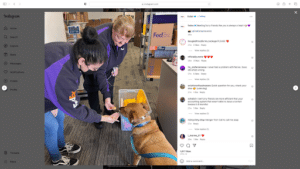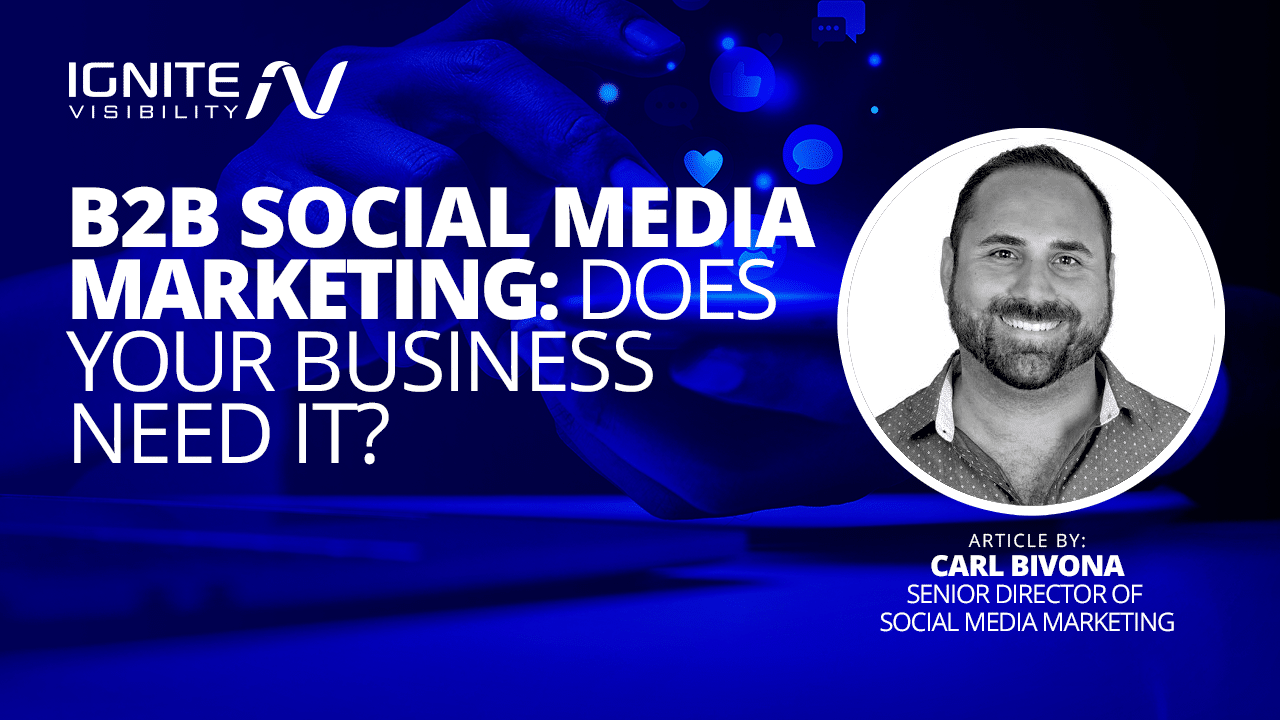
In today’s hyper-connected world, business-to-business (B2B) marketing is undergoing a transformative change. The strategies that once worked in the market of personal contacts and firm handshakes are often being reshaped by digital mechanisms, compelling us to view B2B interactions through a fresh lens.
Social media, known for its real-time connection and vast user base, has emerged as a critical marketing avenue for B2B interactions.
A recent study shows that 84% of B2B marketers are turning to social media, specifically LinkedIn, making it the most commonly used B2B marketing tactic.
It is bringing about a paradigm shift in how businesses converse, engage, and ultimately forge enduring relationships.
In this blog, we will open the door to this evolving realm, underlining the key elements that you, as a B2B marketer, need to understand to harness the power of social media, including:
- The benefits of B2B social media marketing
- B2B social media strategy ideas
- Recent B2B social media trends
- And more!
Let’s dive in!
What is B2B Social Media Marketing?
Any B2B organization that aims to enhance its digital presence, reach potential clients, boost sales, and gain valuable industry insights can benefit from B2B social media marketing. This includes small, mid-sized, and large companies in varying sectors.
By using social media as a marketing tool, your brand can reach a broader audience, build reputation and trust, and engage with customers more efficiently.
Additionally, digital marketers can also use B2B social media marketing for beneficial tasks such as URL Optimization, social engagement boosting, and running retargeting campaigns.
What Are the Benefits of B2B Social Media Marketing?
The benefits of embarking on a B2B social media marketing strategy are plentiful, including:
- Brand Recognition: Using social media platforms allows businesses to increase their exposure and the visibility of their brand. This extended reach can lead to increased brand recognition among potential clients.
- Community Building: Social media platforms serve as meeting places where businesses can engage with their audience and foster relationships. This helps build a loyal community around the brand.
- Lead Generation: Effective B2B social media marketing can help businesses generate high-quality leads. By promoting products or services on social media, businesses can attract potential customers and direct them toward their conversion-optimized web pages.
- Improved SEO Rankings: Regularly posting relevant content on social media platforms can indirectly influence a website’s SEO ranking, making the business more discoverable online.
- Cost Effectiveness: Social media marketing requires little to no capital investment, making it a cost-effective method of advertising. Even when opting for paid promotions, businesses can enjoy a good return on investment as compared to traditional marketing methods.
- Insights and Analysis: Social media platforms provide businesses with detailed insights and analytics, enabling them to track their performance, gain knowledge about their audience, and understand market trends.
17 Reasons Your B2B Business Needs to Be on Social Media
Operating online and connecting with other organizations on various social media platforms can work wonders for your brand.
It not only enhances your visibility but also fosters favorable relationships with your clients and partners, ultimately driving your business success.
Let’s dive into the compelling reasons why your B2B brand should leverage social media to its fullest potential.
1. Brand Visibility
Social media platforms are indisputable powerhouses for promoting brand visibility in the B2B market. Your potential, highly educated clients and key decision-makers are actively present on these networks.
2. Audience Engagement
Audience engagement on B2B social media builds brand trust, amplifies visibility, gathers useful feedback, drives website traffic, enhances customer experience, and improves SEO rankings.
3. Lead Generation
B2B social media can elevate your company by identifying potential clients, enhancing sales funnel efficacy, increasing conversion rates and revenues, and optimizing return on marketing investment. LinkedIn alone accounts for 80% of all B2B social media leads.
4. Competitive Advantage
B2B social media grants a competitive advantage through increased brand visibility, real-time audience insights, recognition as an industry authority, and effective differentiation in a crowded digital marketplace.
5. Industry Insights
Maintaining active engagement on social media platforms offers valuable insights into evolving industry trends and shifts in customer preferences, essential for shaping effective marketing strategies.
6. Content Dissemination
B2B social media serves as a powerful conduit for disseminating valuable content, showcasing thought leadership, and sharing educational resources, strengthening brand relevance and audience engagement.
7. Networking
Social media nurtures B2B networking and enables businesses to forge dynamic partnerships within their industry, opening pathways to collaborative growth and mutual success.
8. Customer Support
Social media serves as a direct and swift conduit for B2B customer support, enabling efficient resolution of queries and concerns, and enhancing customer satisfaction and loyalty.
9. Crisis Management
Social media enables B2B companies to effectively manage PR crises. It provides a platform to swiftly communicate, address rumors, and reaffirm stakeholder trust with transparency and sincerity.
10. Analytics and Data
B2B social media platforms provide robust analytics tools. These offer valuable insights to track performance, helping businesses make informed, data-driven decisions to optimize marketing strategies.
11. Global Reach
Leveraging social media simplifies the path to global expansion for your B2B business. It keenly connects you to international markets, driving growth beyond geographical borders seamlessly and effectively.
12. Recruitment
Social media platforms are potent tools for attracting top talent in B2B markets. They streamline recruitment, connecting businesses directly with ambitious professionals seeking rewarding career paths.
13. Community Building
When done right, fostering a communal space for customers cultivates loyalty and turns customers into powerful brand advocates, further strengthening your business’s digital presence.
14. Customer Feedback
Social media platforms in B2B landscapes facilitate smooth customer feedback collection. By engaging with customers, businesses can garner valuable insights, aiding in refining products and services to enhance value.
15. Influencer Partnerships
Collaborating with industry influencers provides credibility to your B2B brand. Their endorsement enhances trust, boosts brand image, and effectively reaches your target audience.
16. Event Promotion
Event promotion and live-streaming on digital platforms amplify your reach, allowing you to engage a broader audience with industry events, product launches, and informative webinars.
17. Scalability
As your B2B company grows, scaling your social media strategy becomes easier. It enables fluid adaptation to new trends, audience growth, and evolving business objectives.
With its potential to create powerful connections, enhance brand credibility, ensure better customer service, and glean important insights, B2B social media should be a cornerstone in your digital marketing strategy.
B2B Social Media Strategy Ideas
Navigating the landscape of B2B social media might seem daunting, but with the right ideas, it doesn’t need to be.
By understanding the fundamentals of B2B social media strategies, even the most complex topics can be straightforward.
Borrow these B2B social media content ideas to successfully engage your target audience while keeping their needs front and center.
1. Promote Lead Magnets
Promoting B2B lead magnets on social media – like guides, checklists, and e-books–attracts more views and downloads, increasing your potential leads. It’s a smart, effective strategy to amplify your brand’s reach and potential customer base.
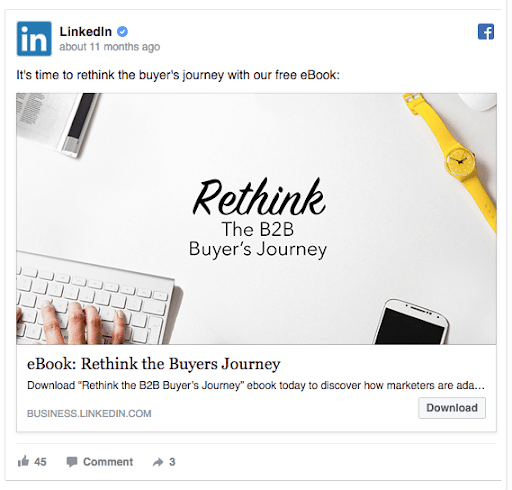
Example of B2B Social Media Strategy – Promoting Lead Magnets
2. Educational Blog Posts
Sharing educational blog posts and industry-related articles positions your brand as an authority. This strategy educates your audience, boosting engagement and fostering trust in your company.
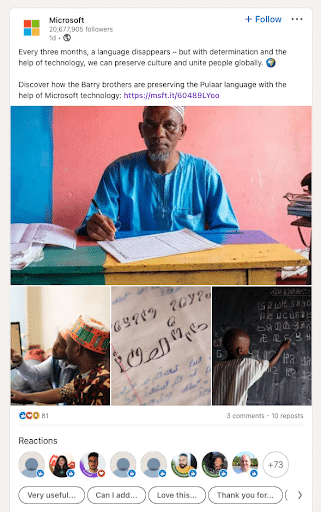
Educational Blog Post Example – Microsoft
3. Case Studies and Testimonials
Sharing case studies and testimonials on social media can powerfully demonstrate your B2B product efficacy. Use this strategy to highlight success stories, accentuating your problem-solving prowess to your audience.
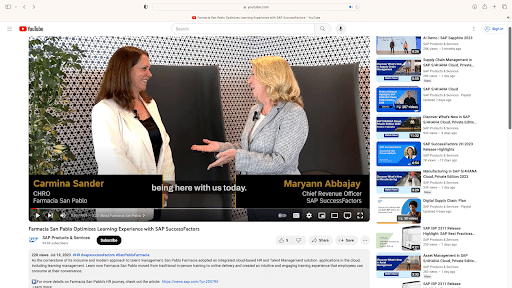
Case Study Example – B2B Social Media Marketing
4. Video Tutorials
Posting video tutorials, product demonstrations, and related educational content on your social media platforms simplifies understanding and illustrates the practical value of your offerings.
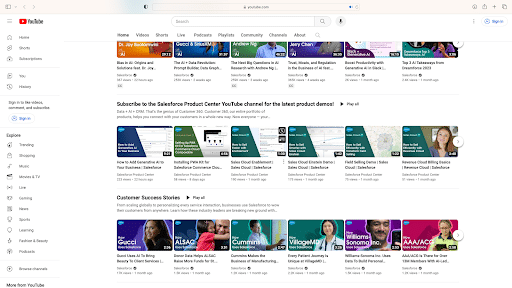
Product Demo and Video Post Examples – Salesforce
5. Behind-the-Scenes
Offering behind-the-scenes peeks reflects your company’s culture, workspace, and the remarkable people powering your brand. This strategy helps build a transparent and relatable relationship with your audience.
6. Interviews and Q&A
Hosting interviews and Q&A sessions with industry experts, thought leaders, or your own team members fosters valuable insights on social media. This approach humanizes your brand while making complex topics accessible to everyone.
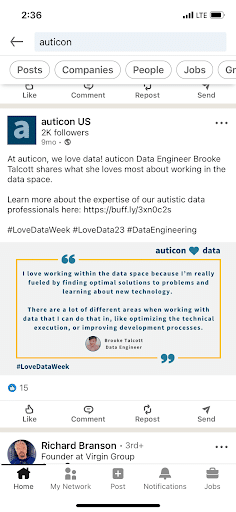
B2B Social Media – Use of Interviews and Q&A Posts
7. Industry News and Insights
Sharing industry news or insights on social media is key. Dissect complex reports, trends, and market research into clear, jargon-free analysis, making valuable data intelligible and beneficial for your audience.
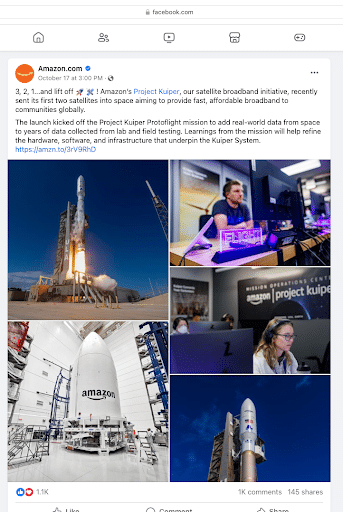
Example of an Industry News Post – Amazon
8. Polls and Surveys
Embrace polls and surveys on social media to capture your audience’s opinions and feedback. This strategy takes the pulse of your followers, revealing their needs, preferences, and ideas.
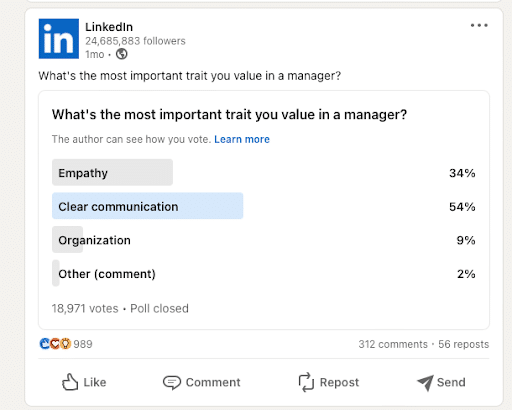
Polls and Surveys for B2B Social Media Marketing
9. Product Spotlights
Spotlighting products or services on social media brings attention to their distinctive features and benefits. This crystal-clear, jargon-free style enables your audience to appreciate their value and relevance.

IBM Product Launch Example
10. Company Milestones
Post company milestones on social media to celebrate anniversaries, achievements, and awards. This fosters community by sharing your brand’s journey and progress in an easily digestible manner.
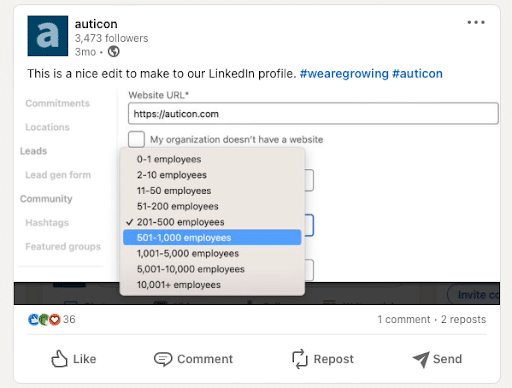
B2B Social Media Post – Company Milestones
11. Contests and Giveaways
Run contests or giveaways on social media to boost engagement and follower count. This tasteful approach not only excites your audience but also enhances brand visibility.
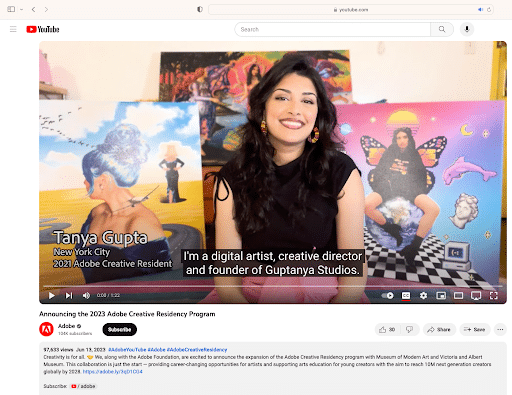
Example of a Content Post
12. Employee Highlights
Highlight team members, their achievements, and roles on social media to showcase your company’s talent. This strategy not only fosters camaraderie but also appeals to future employees.
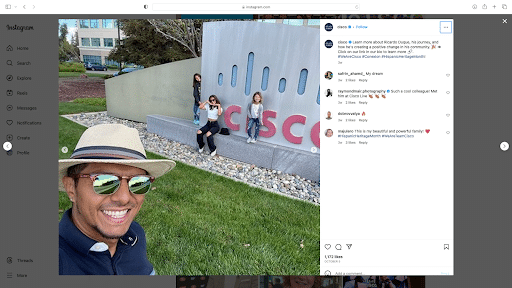
Employee Highlight Example Post from Cisco
13. Holiday and Seasonal Posts
Craft content around relevant holidays and seasons on social media. This approach creates universal appeal, drawing in your audience with timely, relatable, and easily comprehensible posts. Keep in mind platforms like TikTok are all about having fun, with 78.9% of users looking for entertaining content.
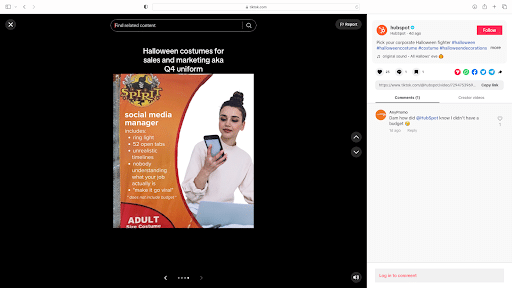
Holiday and Seasonal Posts
14. Quotes and Inspirational Messages
Share motivational quotes and inspirational messages related to your business. These nuggets of wisdom can spark creativity, drive ambition, and infuse a clear sense of direction.

Example of Quotes and Inspirational Messages
Navigating the world of B2B social media isn’t always straightforward. But with these dynamic and accessible ideas, you’re now armed with the knowledge you need to make a significant impact.
Keep in mind; that the most effective B2B social media strategies are always customer-focused and value-driven. By consistently applying these principles, you can facilitate meaningful engagement, create stronger relationships, and ultimately drive growth for your business.
B2B Social Media FAQs
1. Why is social media important for businesses?
Social media can significantly enhance brand awareness, customer loyalty, and lead generation. It offers a platform where businesses can reach their target audience efficiently, encourage engagement, and forge personal connections.
2. What are the top social media platforms for businesses?
Facebook, Instagram, X, LinkedIn, and Pinterest are popular platforms. The choice depends on the nature of your business, the target audience, and your marketing objectives.
3. How often should I post content on social media?
There’s no fixed rule. The key is consistency. Frequency varies across platforms and depends on your audience engagement, but aim for at least a weekly post on most platforms.
4. How do I measure the success of my social media efforts?
Key metrics are Likes, Shares, Comments, Click-through Rate (CTR), and Conversion Rate. These demonstrate both engagement and conversion effectiveness, offering insights for performance improvement.
5. How does social media contribute to SEO?
Although social signals aren’t direct SEO factors, high-quality shareable content can increase visibility, drive traffic to your website, and indirectly boost your search engine rankings.
Ignite Your B2B Social Media Strategy
Remember: social media marketing is not about direct selling.
It’s about building long-lasting relationships, providing value, and fostering engaging communication.
We can help you:
- Position your brand as a go-to resource.
- Lead buzzworthy conversations.
- Stay connected to the heartbeat of your industry.
Contact us for a free proposal today.
